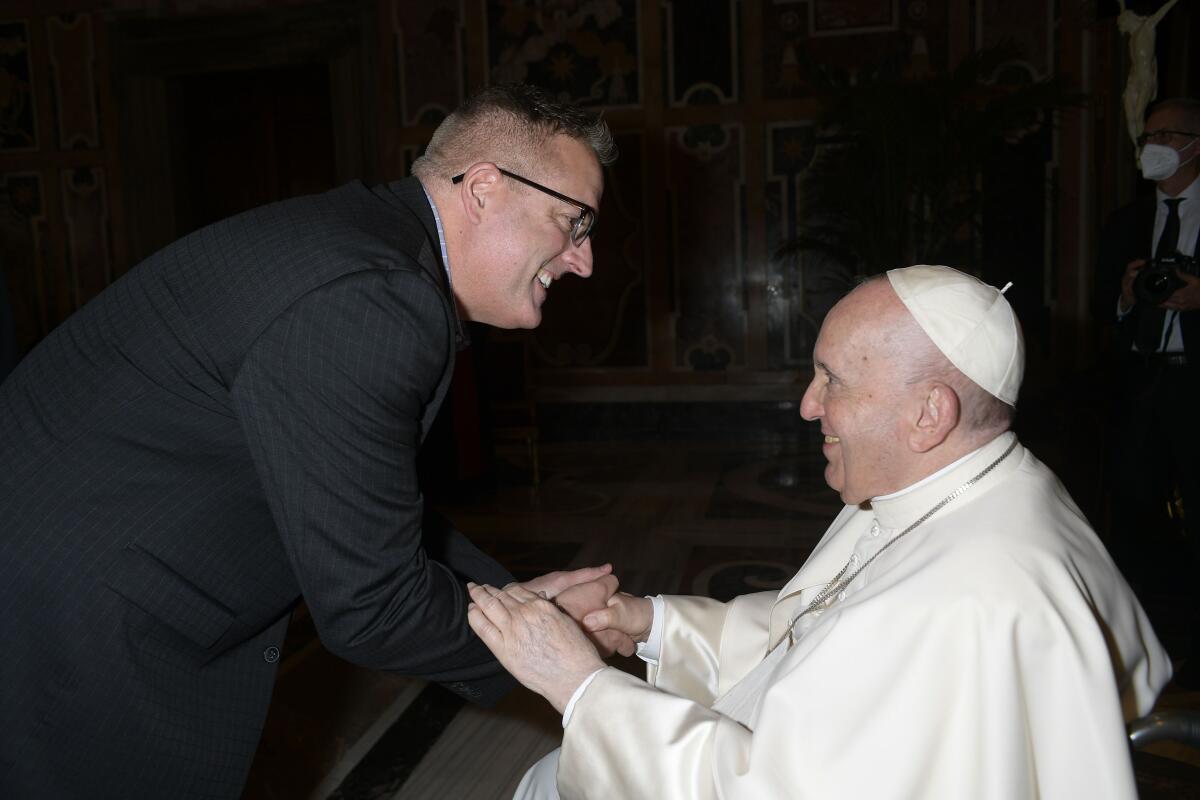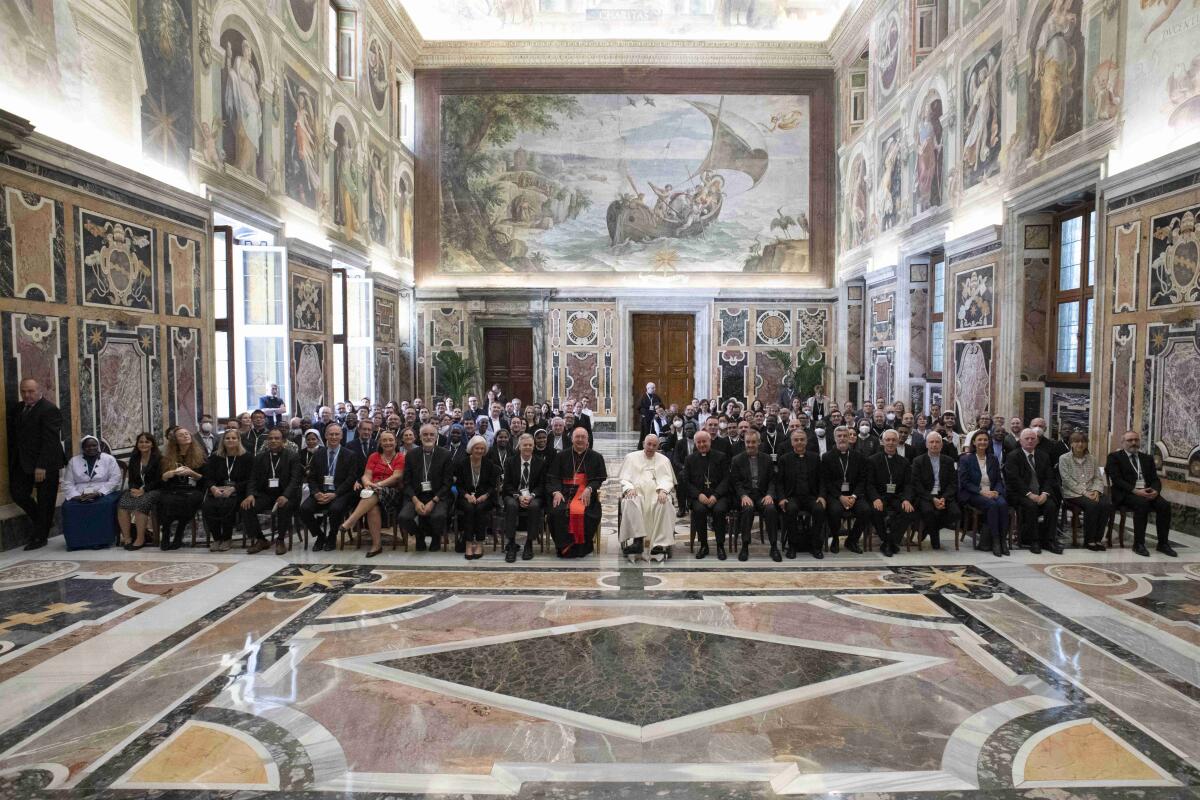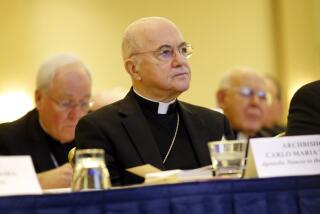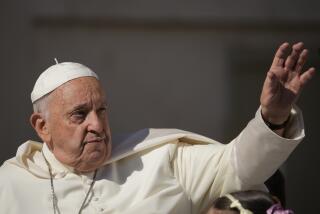What did a San Diegan once chased out of his church for his LGBTQ ministry tell Pope Francis?

SAN DIEGO — As he approached Pope Francis, who was seated in a wheelchair because of a painful knee and clothed in his familiar white cassock and cap, Aaron Bianco already had been coached on what not to do. Don’t bow or genuflect; he doesn’t like that. Don’t kiss his ring; it makes him angry. But do take off your mask; he wants to see your face.
Bending over to get closer to him, Bianco gave him a handwritten letter, which staff members promptly snatched. Then Francis reached up and clasped Bianco’s hands as his visitor began to speak.
“Your holiness, my name is Aaron Bianco. I’m a professor at the University of San Diego.” At the mention of San Diego, the pontiff noticeably brightened and they spent a couple moments sharing their mutual admiration for Robert McElroy, local bishop of this diocese who would be named a cardinal two weeks later.
Bianco pressed on. “I work with LGBT Catholics in the United States, and I want to thank you for speaking up that all people should feel welcome in the church.”
Francis squeezed Bianco’s hand. “He said, ‘You need to continue that work because they need to feel welcome in the church, and we need more people like you.’ ”
As Bianco walked back to his seat, tears filled his eyes.
What a difference four years can make.
In October 2018, Bianco’s tears were of another kind. He was stepping down from his lay ministry to gay and lesbian parishioners at St. John the Evangelist Church in Hillcrest, chased out by a vitriolic campaign mounted by anti-gay factions who published invasive diatribes on websites, vandalized his car, scrawled a homophobic slur on a church wall and even threatened his life.
It was, in short, a living hell.
But there he was last month at the Vatican as an invited guest, communing with the leader of 1.3 billion Catholics — the largest Christian church on the planet. And that leader had just told him to keep up the good work.
It was a long way from hell.
“Ineffable” is how he describes the experience — one of those precious moments that is beyond words.
Bianco, who teaches in USD’s theology and religious studies department, was in Rome to deliver a paper on the plight of LGBT Catholics at an international conference exploring Pope Francis’ 2016 treatise on marriage and family, “Amoris Laetitia.” The document, which called for better integration of divorced, remarried and LGBT Catholics, had gained widespread attention when it was released and the pope now wanted the church to explore the ideas more deeply. Held May 11-14, the conference drew more than 150 participants.

Sharing their stories
He began his presentation by introducing himself as a gay man living in a committed relationship for 17 years, but then segued into a slide show that told four stories of other gay Catholics and their feelings of exclusion and condemnation as they struggle to live authentic lives. Among them: An older gay man who, with his partner of 35 years, raised a niece who is now a nun, and a lesbian couple who watched Mass on TV for years rather than risk the pain of being denied the Eucharist because of who they are.
“I didn’t want the talk to be about me,” Bianco says. “I really do this for other people. I think I’m at a place where I understand the church and I know how the church works and I don’t get too flustered when I hear things that I don’t like. I know what it means to be a Catholic. But what’s sad to me is people who aren’t at that place and they leave because they’re unhappy.”
He was nervous when he stood to deliver his address, which was held in a breakout session. But as soon as he began to show the slides and tell their stories, he saw by the concentration on people’s faces that it was working. “There was one sister who teaches at a university in Nairobi. I do believe I saw tears starting to come down her eyes.”
Emily Reimer-Barry, an associate professor of Christian ethics at USD, sat in on Bianco’s talk. Most of the seats in the room were taken — and there was a line of people waiting afterward to speak to him.
The stories resonated with the audience, says Reimer-Barry, who delivered a paper on women in the church at the conference. “People see the humanity. Even I as a cisgender, heterosexual female can hear those stories and be moved. It’s not because I share their sexual orientation. It’s because I see their humanity. I see their struggle. He was able to bring those stories to light and that’s just such a gift.”
It was Reimer-Barry who urged Bianco to submit a proposal to speak at the conference. “I really thought that Aaron’s expertise and voice would contribute significantly to the conversation in Rome. I was not surprised when it did.”
While Bianco’s talk praised the pontiff for taking steps toward inclusion, he also pointed out where Francis’ treatise fell short. He especially took umbrage at Francis referring to same-sex relationships as “irregular.”
He also criticized priests and bishops who deny the Eucharist to LGBT Catholics. “Eucharist is the pinnacle of God’s love and dwelling within us,” he told the conference. “Should we not find ways to bring all those in ‘irregular’ situations back to the Lord?”
The letter Bianco wrote to the pope included two of the stories.
Wait — and see
What effect this conference might have remains uncertain. While the pope himself seems open to change, his words have had little effect on official church policy, which continues to teach that “under no circumstances” are same-sex acts condoned.
Bianco acknowledges the challenge of balancing centuries of teaching with an evolving awareness of sexuality. And he is walking proof of the deeply held resistance on the part of many conservatives and traditionalists who are convinced this is a sin too great to overcome.
And this isn’t the only issue before the church. What about the debate over female priests and married priests?
“I think [Pope Francis] often thinks to himself, ‘If I move too fast, what’s going to happen?’ So how do we move at a rate that is not going to cause some kind of schism inside the church?”
Bianco remains convinced that he can do more good working for change within the church than leaving and going somewhere else.
“For me, I truly believe that at my baptism it became my home,” says Bianco, a cradle Catholic from New York.
He praises the pope’s decision to elevate Bishop McElroy, who is considered a progressive, to the College of Cardinals, leapfrogging over higher-ranking, but more conservative, archbishops.
“There are parts of the church that I disagree with. I make no bones about that,” Bianco tells me. “But I also in the church have found some of the most kind, loving, gospel-oriented people that I have ever met who love me just the way I am.”
Dolbee is the former religion and ethics editor of the San Diego Union-Tribune and a former president of the Religion News Assn. Email: [email protected].
More to Read
Sign up for Essential California
The most important California stories and recommendations in your inbox every morning.
You may occasionally receive promotional content from the Los Angeles Times.










